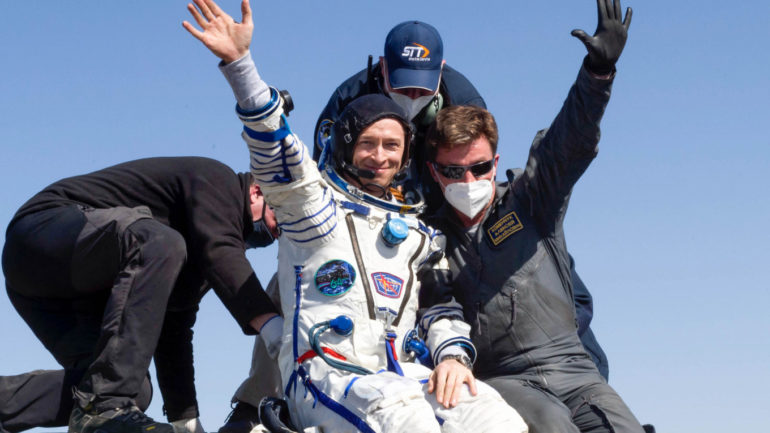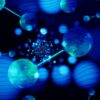Two Russian cosmonauts and a NASA astronaut touched down Saturday on the steppe of Kazakhstan following a half-year mission on the International Space Station, footage broadcast by the Russian space agency showed.
Russia’s Sergei Ryzhikov and Sergei Kud-Sverchkov as well as NASA’s Kate Rubins landed on barren land at 0455 GMT around 150 kilometres (90 miles) southeast of the town of Zhezkazgan.
The Soyuz descent module carring the trio landed upright after descending through a cloudless sky on a fine spring day in central Kazakhstan, a Roscosmos TV commentator confirmed.
Molecular biologist Rubins, 42, and former military pilot Ryzhikov, 46, were rounding off their second missions in space having both made their ISS debuts following launches in July and October of 2016 respectively.
Kud’-Sverchkov, 39, another ex-military man, was completing his first mission.
Footage from the landing site showed Rubins smiling as she received a bouquet of flowers from retired cosmonaut Yuri Malenchenko, who was there to greet the crew.
“It is great to be on this side of things,” Rubins said.
She will return to NASA’s hub in Houston while colleagues Ryzhikov and Kud-Sverchkov are bound for Moscow as they wind down their missions.
During her debut mission in 2016, Rubins became the first person to sequence DNA in space.
In her second mission she continued her sequencing activities, worked on cariovascular experiments and oversaw a small patch of radishes “as they grew in orbit… harvesting them for analysis back on Earth”, according to NASA.
Busy orbital lab
For the last decade, the space station’s population has typically varied between three and six as crews that blasted off from Russia’s Baikonur cosmodrome in Kazakhstan came and went.
Entrepreneur Elon Musk’s SpaceX last year broke the monopoly that Russia and Baikonur had held on manned launches since the mothballing of the US shuttle programme in 2011, beginning a new chapter of spaceflight from US soil.
As a result the number of crew on board will reach 11 next week with the arrival of NASA’s SpaceX Crew-2 mission.
NASA’s Shane Kimbrough and Megan McArthur, Japanese astronaut Akihiko Hoshide, and Thomas Pesquet of the European Space Agency are expected to dock with the ISS next Friday, with the four-person crew they are replacing scheduled to return to Earth on April 28.
The absolute record for people aboard the ISS was set in 2009, when an arriving crew took the orbital lab’s population to 13.
That is also the joint all-time record for the most people in space at any one time after seven astronauts were aboard the NASA space shuttle Endeavour and a six-man crew was aboard the Mir space station simultaneously in March 1995.
Continuously occupied for more than 20 years, the ISS is expected to be retired before the end of the decade, raising questions about future cooperation between Russia and the West in space.
NASA on Friday said it had selected SpaceX to develop a spacecraft to land the first astronauts on the surface of the Moon since 1972—a huge victory for Elon Musk’s company.
April 12 marked the sixtieth anniversary of Soviet cosmonaut Yuri Gagarin’s historic mission marking the beginning of human spaceflight and a key moment in the space race between Moscow and the West.
Since the fall of the Soviet Union there has been more cooperation than competition, although it is difficult to disguise the appearance that Roscosmos and NASA are going their separate ways as the ISS winds down.
American, Russians dock at International Space Station
2021 AFP
Citation:
Two Russian cosmonauts, NASA astronaut return from ISS (2021, April 17)
retrieved 17 April 2021
from https://phys.org/news/2021-04-russian-cosmonauts-nasa-astronaut-iss.html
This document is subject to copyright. Apart from any fair dealing for the purpose of private study or research, no
part may be reproduced without the written permission. The content is provided for information purposes only.



